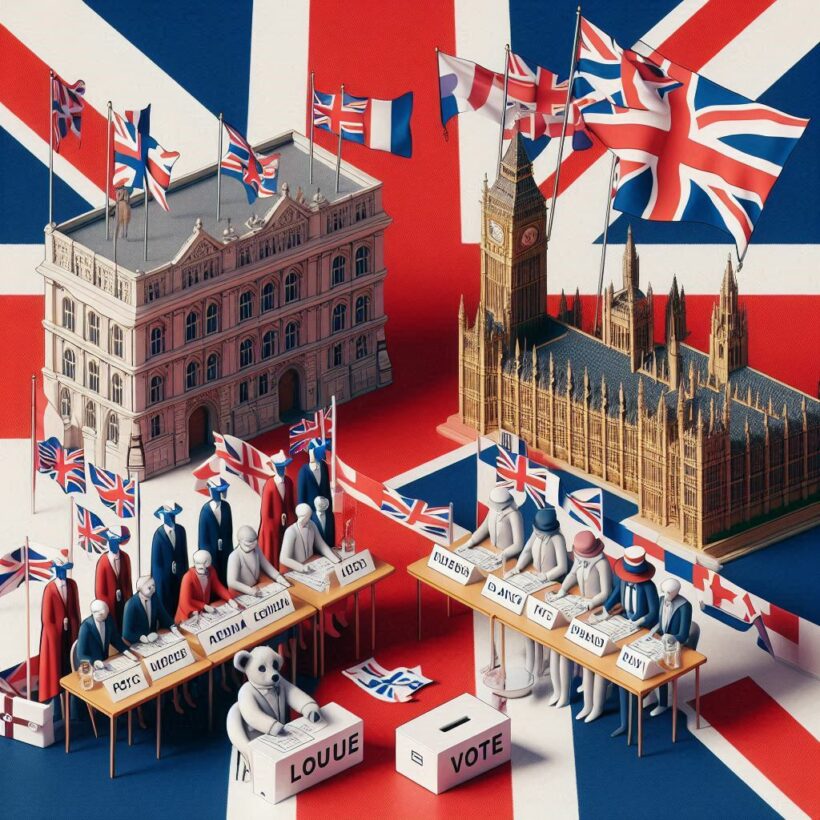Elections to the national parliaments in the UK and France took place at the beginning of July 2024. In the UK, the Conservative Tories suffered a resounding defeat, while Labour was able to govern with an absolute majority for the first time in over 10 years. In France, the Nouveau Front Populaire (NFP) alliance became the strongest force in parliament, even though it missed out on an absolute majority. Both elections certainly have a signal effect, although the results are also due to the majority voting system in both countries.
By International Federation of Resistance Fighters – Association of Anti-Fascists
The British first-past-the-post system only reflects the actual political mood in the country to a limited extent, as a comparison of the percentage election results from 2024 shows. Labour gains 1.4% and achieves 411 seats with 33.8%, while the Tories lose almost 20%, plummeting to 23.7% and only having 120 seats. A large number of these Tory votes went to Nigel Farage and his “Reform UK”, which won 12.3% and became the third strongest party with 14.3%, but only five seats. The Liberals gained 0.7% and achieved 71 seats with just over 12%, while the Greens were able to enjoy four seats with 6.8%. The Scottish Independence Party fell, with 2.4% and only nine seats. However, Sinn Fein and the Welsh party were able to maintain their positions.
In France, too, the majority voting system is shifting the mood in the country. After it looked as though the RN – in a coalition with the Zemmour party – was going to win in the first round of the parliamentary elections (see Newsletter 2024-27), a new constellation actually emerged as a result of social mobilization and agreements between the Macron party “Ensemble” and the NFP that were partially adhered to. Importantly, voter turnout was also high in this ballot. As the strongest force, the NFP achieved 182 seats. Although this is far from an absolute majority (289 seats), its political weight cannot be overlooked. In addition, around 10 independent left-wing candidates were elected, meaning that almost 200 votes can be counted for the NFP group.
After the disaster of the first election round (21% of the vote), Macron’s party came second with 168 seats. However, it is questionable whether the 45 seats held by the conservative Les Républicans can be seen as a coalition partner in parliament. Its leaders are more likely to focus on the RN, which fell well short of its own expectations and political forecasts with 143 seats.
However, if you look at the absolute figures of this election, it becomes clear that there can be no reason for anti-fascists to sit back and relax. Even in the second round of voting, the RN remained the strongest political force in absolute terms.
President Macron’s stance of “playing for time” by rejecting the resignation of Prime Minister Attal cannot be a successful strategy against the advance of the extreme right. Marine Le Pen has already positioned herself on election night for the upcoming presidential election, in which she hopes not only to reach the run-off again, but this time actually come to the top.
The political consequences in both countries are similar. The people who took part in the election have high expectations of a political realignment. The central slogan in the UK was “change”, even if Labour only won 1.4%. However, everyone who voted Labour expected a significantly improved health service, progress in public services and a reversal of the Tories’ racist deportation policy. The fact that Jeremy Corbin was directly elected to the House of Commons as an independent shows that there is a mood in society for a progressive awakening. However, this would require Labour to sharpen its own program and make cuts to the economic balance of power in the UK, as otherwise the financial resources for state tasks would not be available. The political problem of racism remains on the agenda. Although the Tories have lost their seats, they have done so in favor of Nigel Farage, who is now playing the racist card against migrants after the Brexit propaganda. Even if Farage only achieved five seats, his political influence is about as strong as that of the AfD in Germany.
In France, too, it will depend on how stable the NFP alliance proves to be within parliament. The alliance was successful in fending off the advance of the extreme right of the RN. Now it is a matter of pushing through people’s demands, e.g. for the withdrawal of pension regulations and other social atrocities. This can only succeed if, in addition to electoral success, social mobilization increases the pressure on parliament. The anti-fascist forces therefore continue to face major tasks.










